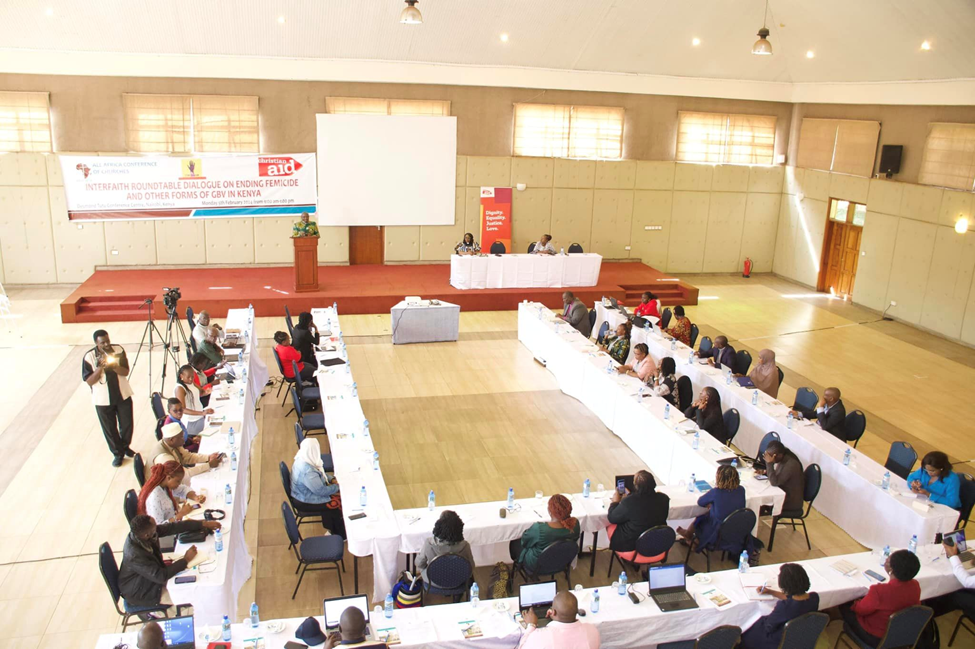
Roundtable dialogue at Desmond Tutu Conference center Nairobi today.
By Benard Mulwa
Artificial Intelligence – AI took the centre stage in a discussion by a section of interfaith today seeking a new legislative to be put in place to protect women and girls against Online Gender Based Violence, it has emerged.
This comes in the wake of alarming rise in femicide cases in Kenya which in many cases are instigated through social media, questioning the safety of internet.
On January 4, 2024, the stabbing to death of 26-year-old Starlet Wahu a popular Instagram figure in a short-term rental apartment made headlines. On the 14th January days after the brutal murder and dismemberment of a 20-year-old Rita Waeni in Nairobi with her remains scattered by the killer and some stuffed in a plastic bag sent shockwaves throughout our communities. Femicide Count Kenya which monitors killings reported in local news, recorded 58 deaths labelled as femicides between January and October 2022. In 2023, the organisation recorded at least 152 killings[1] – the highest in the past five years and 14 cases have already been reported in January 2024.
The Kenya Demographic and Health Survey (KDHS) indicate that over 40 percent of women have experienced physical or sexual intimate partner violence in their lifetime. In all these cases, the blame has shifted from perpetrators to the victims. Evelyn Apondi, a feminist expert said “This staggering number only represents cases reported in the media and doesn’t represent the true count as on average a woman or girl is killed every day, often by a close family member”, adding that, Violence against women and girls is violence against the entire humankind, and should have no place in Kenya or anywhere in the world. It is disheartening to witness the loss of innocent lives, and we extend our deepest condolences to the families affected by these tragic events.
Christian Aid Kenya Country Director, Mrs Janet Ngombalu, said in a statement, “Society’s response to gender-based violence can be enhanced if we invest in seeking to understand some of the key drivers of the epidemic adding that, the sacred texts are clear that we must seek knowledge having a fuller understanding of the complexity of gender-based violence will enable us to develop and implement more effective responses. “We can no longer remain silent, nor assume that gender-based violence is a ‘private issue.’ The statement reads in part, it is in many instances a matter of life and death; a matter of human security, dignity, faith, human rights and is key to the prosperity of the entire nation.
Sheik Abuhamza of Jamia mosque Nairobi said “we commend the media for amplifying the heinous acts of femicide and other forms of GBV and urge them to continue relentlessly, and we further commend all other organizations that have condemned the vice, including marching on the streets”.
We call on the government of Kenya to hasten to make efforts to bring all perpetrators to justice,” We call on the Government of Kenya to ensure progress towards implementation of the Sexual Offences Act (2006), the National Policy on Prevention and Response to Gender based Violence 2014 outcomes, and the enforcement of all laws and policies that respond to Gender Based Violence. All relevant Ministries, Departments and Agencies of the government must task to work in concert with other institutions including law enforcement authorities in mitigating the heinous acts of femicide and other gender-based violence.
We also call on government to enforce treaties it has ratified on this issue such as The Protocol to the African Charter on Human and Peoples’ Rights on the Rights of Women in Africa, (Maputo Protocol) and Convention on the Elimination of All Forms of Discrimination against Women (CEDAW) among others.
We call all institution of learning to instil value for human life, and respect for the dignity and God’s image in every human being
Our Commitment
The faith community in Kenya stands united, transcending religious boundaries to condemn femicide and all other forms of GBV in the strongest terms possible. Our shared commitment to justice, human dignity, and the sanctity of life compels us to address this issue comprehensively and collaboratively. We therefore commit to the following:
Education and Awareness: We commit to continue educating our congregations and communities on the root causes of femicide and other forms of GBV, dismantling harmful stereotypes, offering mentorship to boychild during cultural forums such as rites of passage to change the perception of young men towards women and promoting healthy relationships founded on mutual respect and equality right from family level.
Interfaith Collaboration: We recognize the strength in unity and commit to engage in continuous interfaith dialogue and collaboration toward addressing toxic societal norms that contribute to femicide for behavioural transformation.
We commit to promote theologies that affirm the dignity and equality of all genders.
Support Services: We commit to create awareness on existing support services (hotlines and safe houses). We further commit to establish and promote accessible support services, including pastoral counselling, psycho-social intervention and safe spaces, to aid survivors and their families in the aftermath of femicide and other forms of GBV.
Advocacy for strengthening legal frameworks: We commit to continuousengagement with policymakers to focus on strengthening the legal framework and ensuring its enforcement.
We therefore urge all citizens, irrespective of religious affiliation, to join hands in the fight against femicide. It is our collective responsibility to create a society where women can live free from fear, violence, and discrimination. Together, let us strive for a Kenya where every life is valued, and every woman can realize her full potential without the threat of harm.
We thank you for your attention and collaboration in addressing this urgent matter. May our shared commitment to justice and compassion guide us in the pursuit of a safer and more equitable society.
